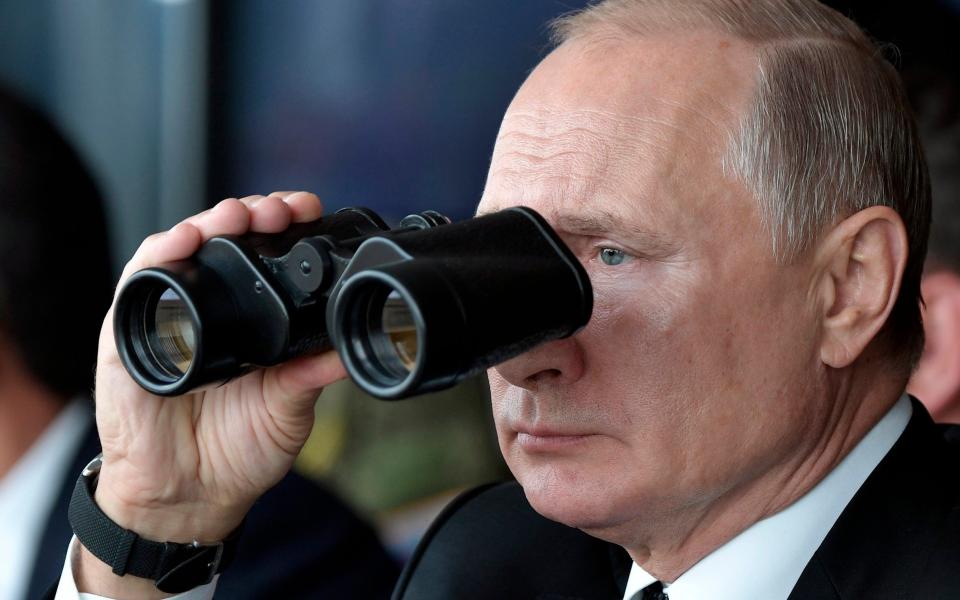Europe braces for higher gas prices as risk of Russian invasion of Ukraine grows

As the energy crisis worsened, Kwasi Kwarteng was criticised for “crossing his fingers” for mild weather, after reportedly using relatively balmy forecasts to try and ease fears over soaring gas prices.
Thankfully for the UK’s business secretary and political counterparts, Kwarteng’s forecasts last October have proven correct. Though gas prices have stayed high, causing huge pain for households, businesses, heavy industry and consumers across Europe, it would have been far worse if a severe cold snap had hit.
Threats to the market loom before the winter is out, however. With fears growing that Putin will invade Ukraine, markets and political leaders are braced for a further shock to gas prices if Russian supplies to Europe are disrupted.
Europe gets about 40pc of its gas from Russia, with a large chunk travelling via Ukraine. Moscow sent 41.6 Bcm of gas via Ukraine to the bloc in 2021, amounting to about 10pc of Europe and Turkey’s combined gas demand. Russia, meanwhile, has also built a new pipeline to Germany, Nord Stream 2, which is waiting for regulators to approve.
Disruption to any of that, whether through physical damage, sanctions, or political retaliation, will push prices up. Fear of that prospect goes a long way to doing the same.
“Should tensions between Russia and the Ukraine escalate, the initial uncertainty around its impact on gas flows would likely lead the market to once again add a significant risk premium to European gas prices,” analysts at Goldman Sachs said in a note on Sunday.
Cold weather could yet also trigger chaos, they add, given the tightness of markets. Goldman warned that a “one-standard-deviation colder-than-average Feb-Mar would lead end-winter inventories below the record lows of 2018, with electricity blackouts likely”.
Tensions between Russia and Ukraine are already having an effect. Benchmark prices in Europe climbed 14pc to €93 per MwH and 17pc to 225 pence per therm in Britain on Monday. While the UK imports little gas directly from Russia, it does from Europe - and prices closely track those on the continent.
Still, it remains well above the long-term average of about 50 pence per therm and far from the worst markets have seen in recent months. In December, European prices hit €182.77 per MwH, and briefly breached 400pence per therm in Britain.
At the core of the problem is global shortages. Maintenance projects on North Sea fields, droughts in Brazil denting hydro-power output, high demand in China as pandemic pressures ease and lower production in the Netherlands have all contributed.
Russia, meanwhile, has been accused of adding to the pressure by withholding supplies from Europe’s spot market. It denies manipulating the market, saying it has fulfilled all contracts.
Now, with 100,000 Russian troops amassed on Ukraine’s border, European leaders are trying to diversify gas supplies and help cushion consumers and households from price rises.
On Saturday European energy ministers met in France to discuss the market turmoil. Estonia’s Kadri Simson, Europe’s energy commissioner, is set to travel to Azerbaijan and Washington in February to discuss ways for increasing gas deliveries to Europe, Reuters reported.
The US government has held talks with several major energy companies and has approached major gas exporters including Qatar about contingency measures, according to reports.
In the UK, ministers have been in talks with energy companies about trying to ease the pain for households of rising energy bills. They are set to climb 56pc in April to £2,000 when the price cap is reset to reflect months of high wholesale costs.
As pipeline supplies in Europe tighten, the UK has been importing more gas via shipments from Russia and further afield.
So far this month Britain has imported 1.9m tonnes of liquified natural gas (LNG) - natural gas cooled and piped onto ships for global export. It is on track to import more in January than any previous month, according to market intelligence group ICIS.
Providing some ongoing relief to European markets, demand for LNG in Asia is starting to wane, notes ICIS analyst Tom Marzec-Manser. China’s Sinopec said last week it aims to sell 45 cargoes this year, indicating supplies are well stocked while temperatures in China are currently mild.
Nothing can be taken for granted, however. Asian demand for LNG is unlikely to remain subdued for long, triggering long-term pressures on European markets. “While not our base case, the tightness in European gas balances that drove prices to historic levels late last year in order to drive industrial demand destruction, might repeat itself over the next few years,” warns Goldman.
Asked about the ongoing risk to gas prices from the tensions over Ukraine, a Government spokesperson said: “Unlike other countries in Europe, the UK is in no way dependent on Russian gas supply. We meet around half of our supply from within British territorial waters and the vast majority of imports come from reliable suppliers such as Norway. Less than 3pc of our gas was sourced from Russia in 2020.
“The energy price cap has been insulating millions of consumers from high global gas prices throughout the winter months. We’ll continue to listen to consumers and businesses on how to manage the costs of energy.”

 Yahoo Finance
Yahoo Finance